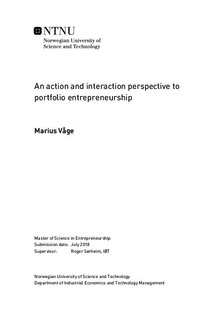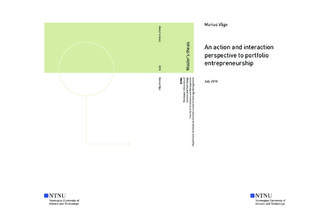| dc.description.abstract | A significant number of entrepreneurs engage in two or more simultaneous business opportunities and these individuals are responsible for a significant contribution to the world s wealth processes and economy in general (Morrish, 2009). From the opportunity-based view, portfolio entrepreneurship is regarded as having e.g., a broader experience, more developed cognitive abilities and access to a broader network which is linked to enhanced opportunity identification and evaluation. The field of portfolio entrepreneurship can be characterized at one level, as being well researched regarding benefits associated with engaging in the phenomenon. However, several topics is still unknown, especially in regards of their unique approaches for developing opportunities. Especially, research that takes the multiple individual - opportunity nexus as a perspective. This regarding how opportunities are developed as a series of actions and interactions. Thus, the purpose of this master thesis becomes to research how a portfolio of business opportunities is developed as a series of actions and interactions, and in a network perspective.
To fulfil the thesis purpose, the author has chosen an embedded and qualitative research design, with three selected out of a portfolios five ventures, as sub unit of analysis. These three were selected, through a preliminary interview, where the author were able to check selection criteria s that were defined to strengthen the data acquisition regarding research questions.
This study found that two of the portfolios entrepreneurs identified their initial business idea of their current ventures, in actions and interactions, that had no entrepreneurial intent. What followingly were found is that all the inherent ventures opportunity development processes, did not reach explorative market related activities of acquiring customer information, before the three business ideas (or customers problems), had socially been exchanged to third parties. Secondly, this study found that there were differences between actions and interactions, that 1) were concerned with initial business idea identification, and the actions and interactions, that 2) were concerned with identify a new portfolio venture. The main differences are regards to scenario 1), open-endedness and homophily and scenario 2) intelligent altruism and causational networking.
To fulfil the thesis purpose, the author has chosen an embedded and qualitative research design, with the three of a portfolios five venture, as sub unit of analysis. These three were selected, upon criteria s of difference growth phases: multinational growth, commercialization, and under development, to in addition to elaborating in their approaches, see if there were any differences or similarities. | en |

